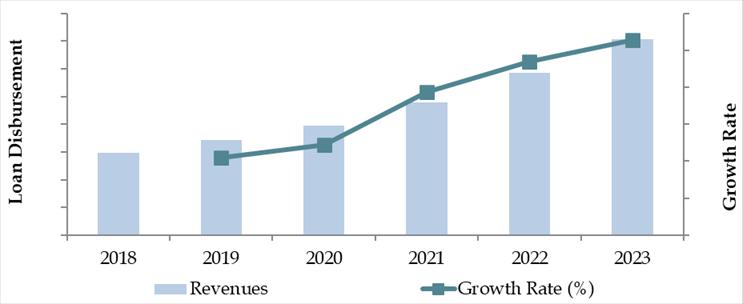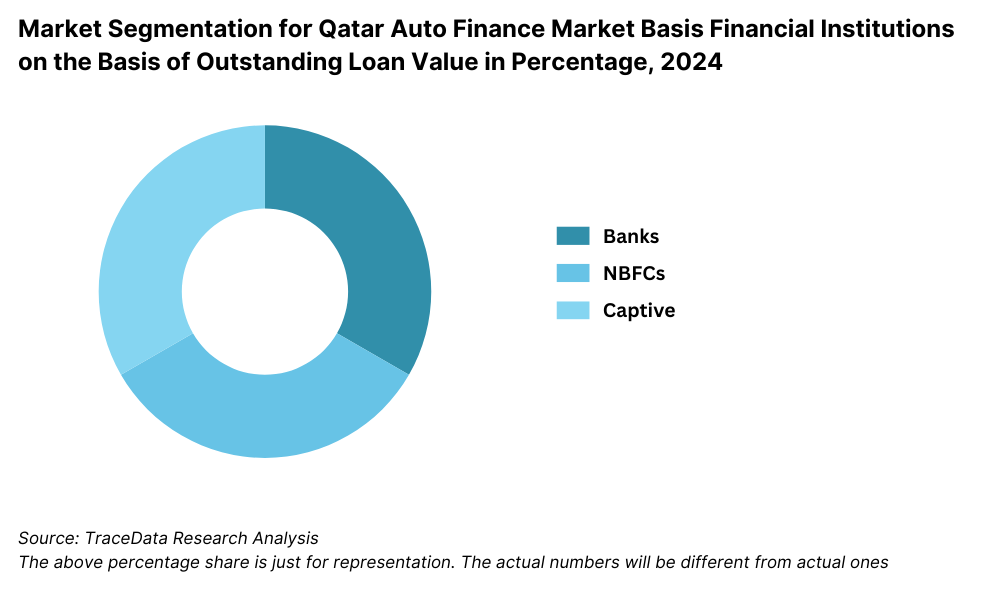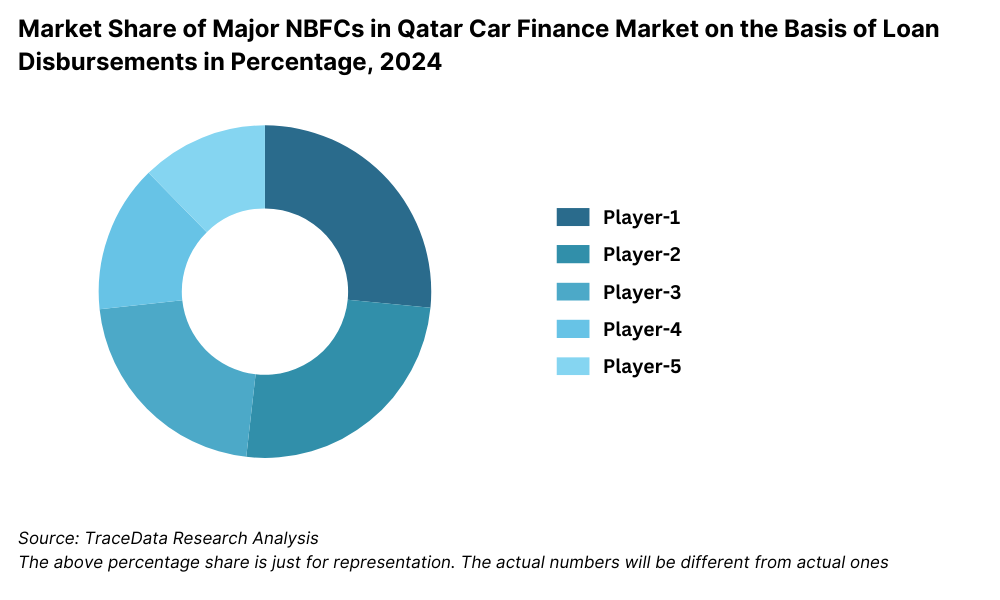Qatar Auto Finance Market Outlook to 2029
By Type of Vehicle, By Loan Provider, By Interest Rate Structure, By Tenure of Loans, By Consumer Profile and By Region
- Product Code: TDR0136
- Region: Middle East
- Published on: April 2025
- Total Pages: 80
Report Summary
The report titled “Qatar Auto Finance Market Outlook to 2029 - By Type of Vehicle, By Loan Provider, By Interest Rate Structure, By Tenure of Loans, By Consumer Profile and By Region” provides a comprehensive analysis of the auto finance market in Qatar. The report covers an overview and genesis of the industry, overall market size in terms of loan disbursements, market segmentation; trends and developments, regulatory landscape, customer-level profiling, issues and challenges, and comparative landscape including competition scenario, cross-comparison, opportunities and bottlenecks, and company profiling of major players in the Auto Finance Market. The report concludes with future market projections based on loan disbursements, by market, vehicle type, region, cause and effect relationship, and success case studies highlighting the major opportunities and cautions.
Qatar Auto Finance Market Overview and Size
The Qatar auto finance market reached a valuation of QAR 18 billion in 2023, driven by increasing vehicle ownership rates, a growing expatriate population, and the availability of competitive financing options. The market is characterized by key players such as Qatar National Bank (QNB), Commercial Bank of Qatar, Doha Bank, and Islamic banks like Masraf Al Rayan. These institutions offer various financing schemes with flexible repayment terms, catering to a broad spectrum of customers.
In 2023, QNB introduced an AI-driven digital loan approval system to streamline the auto finance process, reducing approval times and enhancing customer experience. Doha and Al Rayyan remain key markets due to their high population density and economic activity, influencing auto financing trends significantly.
Market Size for Qatar Auto Finance Industry on the Basis of Loan Disbursement in USD Billion, 2018-2023

What Factors are Leading to the Growth of Qatar Auto Finance Market?
Rising Vehicle Ownership: The increasing number of expatriates and the expanding middle-class population have significantly contributed to vehicle ownership, boosting demand for auto finance solutions. In 2023, auto loans accounted for approximately 70% of total vehicle purchases in Qatar.
Low-Interest Rates: Favorable lending rates provided by both conventional and Islamic banks have made auto financing an attractive option for consumers. Interest rates for auto loans in 2023 ranged between 2.5% and 4.5%, making financing a cost-effective alternative to outright purchases.
Digital Transformation: The integration of AI and online banking platforms has simplified the auto loan approval process. In 2023, approximately 45% of auto loans were processed digitally, reflecting a shift towards tech-driven solutions.
Which Industry Challenges Have Impacted the Growth for Qatar Auto Finance Market?
Regulatory Compliance: Stringent banking regulations and Sharia-compliant financing structures can sometimes limit the availability of flexible loan options. Approximately 25% of potential borrowers in 2023 faced restrictions due to compliance-related challenges.
Rising Vehicle Prices: Inflation and increased import costs have led to higher vehicle prices, indirectly affecting the demand for auto finance. On average, the cost of new cars increased by 7% in 2023, impacting affordability.
Credit Accessibility: Limited credit history among expatriates remains a significant barrier to securing loans. Nearly 30% of non-resident applicants in 2023 were unable to obtain financing due to inadequate credit records.
What are the Regulations and Initiatives Which Have Governed the Market?
Central Bank Regulations: The Qatar Central Bank (QCB) regulates interest rates and loan tenures, ensuring transparency in auto finance agreements. In 2023, QCB imposed a maximum loan tenure of 5 years for new vehicles and 3 years for used vehicles.
Sharia-Compliant Auto Financing: Islamic banks offer Murabaha-based financing, which is interest-free but includes a profit margin. This segment accounted for nearly 40% of total auto loans in 2023.
Government Incentives for Electric Vehicles: The Qatari government has introduced subsidies and tax exemptions for EV purchases, encouraging banks to offer special financing schemes for electric cars. In 2023, EV financing made up 5% of total auto loans, a number expected to rise as sustainability initiatives gain traction.
Qatar Auto Finance Market Segmentation
By Market Structure: Conventional banks dominate the market due to their established customer trust, comprehensive loan products, and wide banking networks. Islamic finance institutions also play a significant role, offering Sharia-compliant auto financing options such as Murabaha-based loans, which have gained traction among local consumers seeking interest-free alternatives.

By Loan Provider: Qatar National Bank leads the market with its extensive financing solutions, followed by Commercial Bank of Qatar and Doha Bank. Islamic banks like Masraf Al Rayan and Qatar Islamic Bank hold a significant market share, catering to consumers preferring Sharia-compliant financing solutions.
By Interest Rate Structure: Fixed interest rate loans are the most preferred financing structure, providing predictability in monthly payments. Variable interest rate loans are also available, offering flexibility but exposing consumers to potential rate fluctuations.
Competitive Landscape in Qatar Auto Finance Market
The Qatar auto finance market is relatively concentrated, with major banks and financial institutions holding a significant share. However, fintech firms and online lending platforms are emerging as disruptive forces, offering faster loan approvals and competitive rates.
Name | Founding Year | Original Headquarters |
|---|---|---|
Qatar National Bank (QNB) Auto Loan | 1964 | Doha, Qatar |
Doha Bank Auto Finance | 1978 | Doha, Qatar |
Commercial Bank of Qatar Auto Loan | 1975 | Doha, Qatar |
Masraf Al Rayan Auto Finance | 2006 | Doha, Qatar |
Qatar Islamic Bank (QIB) Auto Loan | 1982 | Doha, Qatar |
Al Khaliji Commercial Bank Auto Finance | 2007 | Doha, Qatar |
Qatar International Islamic Bank (QIIB) Auto Finance | 1991 | Doha, Qatar |
HSBC Qatar Auto Loan | 1954 | London, UK |
Al Jazeera Finance Auto Loan | 1989 | Doha, Qatar |
Toyota Financial Services Qatar | 1982 | Toyota City, Japan |
Some of the Recent Competitor Trends and Key Information About Competitors Include:
Qatar National Bank (QNB): As the largest financial institution in Qatar, QNB reported a 12% growth in auto loan disbursements in 2023. The bank's integration of AI-driven credit assessments has streamlined loan approvals, reducing processing times significantly.
Commercial Bank of Qatar: A leader in digital banking services, Commercial Bank saw a 9% rise in auto loan applications via its online banking platform. The bank's low-interest financing options for hybrid and electric vehicles have gained substantial traction.
Doha Bank: With a focus on expatriate financing, Doha Bank introduced flexible loan tenures for foreign nationals, leading to a 15% increase in loan approvals for this demographic in 2023.
Masraf Al Rayan: Known for its Sharia-compliant auto loans, Masraf Al Rayan reported a 10% rise in Murabaha-based financing solutions, driven by consumer demand for interest-free financing.
Qatar Islamic Bank: The bank has expanded its auto finance segment by offering exclusive financing for electric vehicles (EVs), resulting in a 7% increase in EV loan disbursements in 2023.



What Lies Ahead for Qatar Auto Finance Market?
The Qatar auto finance market is projected to grow steadily by 2029, exhibiting a respectable CAGR during the forecast period. This growth is expected to be fueled by economic factors, increasing vehicle ownership, and rising consumer confidence in the financial sector.
Shift Towards Electric Vehicles: As the Qatari government continues to promote sustainability initiatives, there is anticipated to be a gradual increase in both the availability and demand for electric vehicle financing. Government incentives and a growing consumer awareness of sustainability will drive this trend.
Integration of Technology: The integration of AI and big data analytics in credit assessment and loan approval processes is expected to provide consumers with more accurate and transparent financial information. This technological advancement will enhance market transparency, boost consumer trust, and streamline loan approvals.
Expansion of Digital Auto Finance Platforms: The market is seeing a shift towards online auto financing solutions, where banks and fintech firms offer instant loan approvals, real-time credit assessments, and seamless digital transactions. This trend is expected to increase market accessibility and convenience.
Focus on Sustainable Finance Practices: There is a rising trend towards green auto financing options, where banks and financial institutions promote eco-friendly vehicles through lower interest rates and flexible financing terms. This initiative aligns with Qatar’s sustainability goals and consumer preferences for environmentally responsible choices.
Future Outlook and Projections for Qatar Car Finance Market on the Basis of Loan Disbursements in USD Billion, 2024-2029

Qatar Auto Finance Market Segmentation
- By Market Structure:
- Conventional Banks
- Islamic Banks
- Fintech Companies
- Non-Banking Financial Institutions (NBFIs)
- Captive Finance Companies
- By Interest Rate Structure:
- Fixed Interest Rate
- Variable Interest Rate
- Sharia-Compliant Financing (Murabaha)
- By Tenure of Loans:
- Up to 3 years
- 3-5 years
- More than 5 years
- By Type of Vehicle:
- New Vehicles
- Used Vehicles
- Electric Vehicles
- Luxury Vehicles
- By Age of Consumer:
- 18-34 years
- 35-54 years
- 55+ years
- By Region:
- Doha
- Al Rayyan
- Al Wakrah
- Umm Salal
- Al Khor
- Al Daayen
Players Mentioned in the Report (Banks):
- Qatar National Bank (QNB)
- Qatar Islamic Bank (QIB)
- Commercial Bank of Qatar
- Doha Bank
- Masraf Al Rayan
- Ahli Bank
- Dukhan Bank
- International Bank of Qatar
- HSBC Qatar
- Arab Bank
Players Mentioned in the Report (NBFCs):
- Nasser Bin Khaled Services
- Automall Qatar
Players Mentioned in the Report (Captive):
- Toyota Financial Services Qatar
- Nissan Financial Services Qatar
- Ford Credit Qatar
- Honda Finance Qatar
- Mercedes-Benz Financial Services Qatar
- BMW Financial Services Qatar
Key Target Audience:
- Auto Finance Providers
- Commercial and Islamic Banks
- Fintech Auto Lenders
- Automotive Dealerships
- Regulatory Bodies (e.g., Qatar Central Bank)
- Research and Development Institutions
Time Period:
- Historical Period: 2018-2023
- Base Year: 2024
- Forecast Period: 2024-2029
Report Coverage
Choose individual sections to purchase. Mix and match as you like.
4.1. Value Chain Process-Role of Entities, Stakeholders, and challenges they face.
4.2. Relationship and Engagement Model between Banks-Dealers, NBFCs-Dealers and Captive-Dealers-Commission Sharing Model, Flat Fee Model and Revenue streams
4.3. Supply Decision-Making Process
5.1. New Car and Used Car Sales in Qatar by type of vehicle, 2018-2024
8.1. Credit Disbursed, 2018-2024
8.2. Outstanding Loan, 2018-2024
9.1. By Market Structure (Bank-Owned, Multi-Finance, and Captive Companies), 2023-2024P
9.2. By Financing Options (Traditional Loans, Leasing, Multi-Finance Loans), 2023-2024P
9.3. By Region, 2023-2024P
9.4. By Type of Vehicle (New, Used, Electric), 2023-2024P
9.5. By Average Loan Tenure (0-2 years, 3-5 years, 6-8 years, above 8 years), 2023-2024P
10.1. Customer Landscape and Cohort Analysis
10.2. Customer Journey and Decision-Making
10.3. Need, Desire, and Pain Point Analysis
10.4. Gap Analysis Framework
11.1. Trends and Developments for Qatar Car Finance Market
11.2. Growth Drivers for Qatar Car Finance Market
11.3. SWOT Analysis for Qatar Car Finance Market
11.4. Issues and Challenges for Qatar Car Finance Market
11.5. Government Regulations for Qatar Car Finance Market
12.1. Market Size and Future Potential for Online Car Financing Aggregators, 2018-2029
12.2. Business Model and Revenue Streams
12.3. Cross Comparison of Leading Digital Car Finance Companies Based on Company Overview, Revenue Streams, Loan Disbursements/Number of Leads Generated, Operating Cities, Number of Branches, and Other Variables
13.1. Finance Penetration Rate and Average Down Payment for New and Used Cars, 2018-2029
13.2. How Finance Penetration Rates are Changing Over the Years with Reasons
13.3. Type of Car Segment for which Finance Penetration is Higher
17.1. Market Share of Key Banks in Qatar Car Finance Market, 2024
17.2. Market Share of Key NBFCs in Qatar Car Finance Market, 2024
17.3. Market Share of Key Captive in Qatar Car Finance Market, 2024
17.4. Benchmark of Key Competitors in Qatar Car Finance Market, including Variables such as Company Overview, USP, Business Strategies, Strengths, Weaknesses, Business Model, Number of Branches, Product Features, Interest Rate, NPA, Loan Disbursed, Outstanding Loans, Tie-Ups and others
17.5. Strengths and Weaknesses
17.6. Operating Model Analysis Framework
17.7. Gartner Magic Quadrant
17.8. Bowmans Strategic Clock for Competitive Advantage
18.1. Credit Disbursed, 2025-2029
18.2. Outstanding Loan, 2025-2029
19.1. By Market Structure (Bank-Owned, Multi-Finance, and Captive Companies), 2025-2029
19.2. By Financing Options (Traditional Loans, Leasing, Multi-Finance Loans), 2025-2029
19.3. By Region, 2025-2029
19.4. By Type of Vehicle (New, Used, Electric), 2025-2029
19.5. By Average Loan Tenure (0-2 years, 3-5 years, 6-8 years, Above 8 years), 2025-2029
19.6. Recommendation
19.7. Opportunity Analysis
Research Methodology
Step 1: Ecosystem Creation
Map the ecosystem and identify all demand-side and supply-side entities for the Qatar Auto Finance Market. Based on this ecosystem, we will shortlist leading financial institutions in the country based on their financial data, loan disbursement capacity, and market reach.
Data sourcing includes industry reports, secondary research, and proprietary databases to perform desk research to compile industry-level insights.
Step 2: Desk Research
Conduct an exhaustive desk research process referencing diverse secondary and proprietary databases. This approach allows us to perform a detailed analysis of the market, covering aspects such as loan disbursement volumes, interest rate trends, regulatory environment, and competitive landscape.
Supplementary company-level data will be collected from sources like press releases, annual reports, and financial statements.
Step 3: Primary Research
Engage in in-depth interviews with C-level executives and stakeholders from major financial institutions and auto dealerships in Qatar. This ensures validation of market hypotheses, verification of statistical data, and extraction of key operational and financial insights.
Conduct disguised interviews where our research team approaches companies as potential clients to validate operational and financial claims against secondary data.
Step 4: Sanity Check
- Utilize a bottom-up and top-down market modeling approach to validate findings and ensure consistency in data analysis.
FAQs
1. What is the potential for the Qatar Auto Finance Market?
The Qatar auto finance market is poised for steady growth, projected to reach QAR 25 billion by 2029. Factors such as an increasing expatriate population, economic growth, and digital advancements in banking services are key drivers of this expansion.
2. Who are the Key Players in the Qatar Auto Finance Market?
Major players include Qatar National Bank, Commercial Bank of Qatar, Doha Bank, Masraf Al Rayan, and Qatar Islamic Bank. Fintech auto lenders are also emerging as significant competitors.
3. What are the Growth Drivers for the Qatar Auto Finance Market?
Key growth drivers include the rise of electric vehicle financing, integration of AI in credit assessment, government incentives for sustainable financing, and increasing digital banking adoption.
4. What are the Challenges in the Qatar Auto Finance Market?
Challenges include stringent regulatory requirements, fluctuating interest rates, and accessibility issues for expatriates with limited credit history.